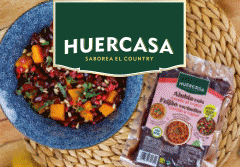Frutas E. Sánchez is expecting to market 65,000 t of apples, both nationally grown and imported
Esther Sánchez, financial manager of the company from Madrid, talked to Fruit Today euromagazine after this first year of pandemic.
We talked just a few days before the lockdown and we are talking again one year later. What has changed for Frutas E. Sánchez?
Actually, what changed is that we had to learn to manage sales very quickly on a daily basis. No medium or long term plans could be made. The start of the pandemic almost coincided with the launch of our new installations, and on this point, and in spite of it having been a very difficult year, filled with uncertainties, the new premises allowed us, and continue to allow us, to work in a very efficient, safe way. Now we have some spacious, functional areas, with a structure that makes moving the goods a great deal easier. All of this meant that employees, clients and suppliers could all work with guaranteed safety. Our response was immediate, 24 hours a day. Managing the entire flow of goods in the previous installations would have been very difficult, therefore, on this point, we could say that we were ready for the pandemic.
How is the apple season unfolding for the company? What volumes are we talking about, both for national production and for imported goods?
Apples are a basic item in the shopping basket and as such, they have worked very well this year. The fact that consumers are trying to reduce shopping times is also associated with purchasing longer-lasting fruit. Added to this is the offer of a very wide variety, acidic or sweet, red or green. It is also a product that has a competitive price. Our aim involves reaching a marketing figure of 65,000 t of national and imported fruit.
Do you think that your brand ‘Qué Rica’ is suffering or benefitting from the important presence and amount of promotions by Italian apples?
Without any doubt, it is benefitting from the crossed promotion. I think that the marketing of any fruit or vegetable always benefits the sector; it makes us present in consumers’ minds and it promotes our healthy nature.
Do you think that consumers’ priorities have changed?
The consumer trends are constantly changing and we must continuously study them. It is obvious that the pandemic has caused an increase in basic products in the shopping basket, which is a trend that is being maintained. And a consumer who is more concerned about eating local produce can be seen, but I don’t think that produce that is not local should be demonised, because at times produce needs to be imported to ensure everything can be found on the supermarket shelves.





















